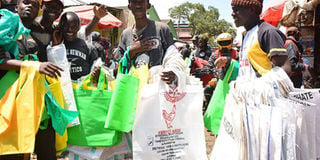Breaking News: At least 10 feared to have drowned in Makueni river
Dilemma as Nema makes U-turn on non-woven bags

Nakuru street vendors sell eco-friendly carrier bags. Polypropylene is one of the biodegradable materials approved by Kebs after the plastic bags ban. PHOTO | FILE | NATION MEDIA GROUP
What you need to know:
- Some scientists say polypropylene is actually worse than the condemned plastic, as the two are made from the same material.
- Studies claiming to show widespread presence of plastics in the human food chain have revealed that bits of plastic have been detected in human stool in Europe, Russia and Japan.
Grace Mutisya walks from a supermarket on Tom Mboya Street in Nairobi city centre carrying milk, fruits, maize flour, bread and other items.
The items are in an eco-friendly reusable bag — a non-woven polypropylene carrier which became popular when Kenya banned plastic bags on August 28, 2017.
In about 12 days, Ms Mutisya and other Kenyans will no longer use these types of bags, which were initially approved by State agencies as an alternative to plastic carriers.
The National Environment Management Authority (Nema) has banned any form of manufacture, import, supply, distribution and use of non-woven polypropylene from March 31.
“I am confused. These bags were publicised as probably the best alternatives to plastic,” Ms Mutisya says.
QUALITY
In an advert on Tuesday, Nema said manufacturers of the bags “known to bear positive characteristics in re-usability and durability” have flooded the Kenyan market with poor quality versions.
“Due to the rising need of non-woven bags in the market, it has been noted … that manufacturers … are producing very low gauge poor quality bags, which cannot be used multiple times,” Nema Director-General Geoffrey Wahungu says in the advertisement.
“The single usage of these bags will eventually lead to heavy environmental consequences due to poor disposal … coupled with lack of requisite infrastructure to sustainably manage these bags.”
According to Mr Wahungu, the ban will be in force until the Kenya Bureau of Standards (Kebs) develops and gazettes a standard that will inform the quality on non-woven bags needed in the country.
POLLUTION
Most of the bags are made locally or imported from China. Polypropylene is one of the biodegradable materials approved by Kebs after the plastic bags ban.
This latest ban means Kebs and Nema will increase market surveillance to get rid of low-quality products.
Hundreds of jobs were estimated to have been lost when factories making plastic bags were shut down. But those producing the recommended packaging materials could now face a similar fate.
Some scientists say polypropylene is actually worse than the condemned plastic, as the two are made from the same material.
When it gets into the water, it releases plastic particles and contaminates it.
HEALTH
While the Nema ban is based on poor disposal practices, studies claiming to show widespread presence of plastics in the human food chain have revealed that bits of plastic have been detected in human stool in Europe, Russia and Japan.
In October last year, researchers at a gastroenterology congress in Vienna, Austria, said all eight volunteers in a small pilot study were found to have passed out several types of plastic, with an average of 20 micro-particles per 10 grammes of stool.
The two most common were polypropylene, found in bottle caps, rope and strapping and polythene terephthalate present in drinking bottles and textile fibres.





